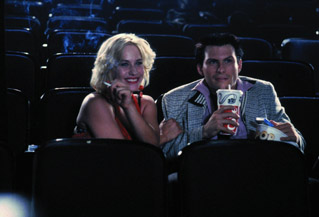Viking Night: True Romance
By Bruce Hall
April 23, 2013
When Clarence reveals all this to Alabama she is not frightened, nor is she repulsed. She doesn't even pause to consider the ramifications of marrying a homicidal maniac. This comes after a satisfyingly simple setup that was just enough to make you care, and possibly even believe, that two people might genuinely fall in love in under the time it takes to marinate a steak. These were two fundamentally decent people who could see past each other's (considerable) flaws and possibly build something together. But to reduce him to an impulsively violent mental patient and her to a masochistic brawler without sufficient motivation robs the film of direction. These are not just a couple of innocent kids trying to beat the odds - they’re dangerous psychopaths who care about nothing but their own gratification.
Had Clarence been forced into murder, forced to flee, this story becomes about two young lovers on the run from a situation they did not create. But since he talks to dead rock stars and takes to murder the way most people take to ranch dressing, he’s difficult to connect with. When Alabama - who we are told is the moral center of this relationship - fails to question any of it, the light inside her goes out as well. So when Drexl’s employer (Christopher Walken) and his mobile goon squad come looking for them, it’s a little hard to tell one sociopath from another. And when Clarence's estranged father (Dennis Hopper) and best friend (Michael Rapaport) get sucked into the violence, it’s impossible not to put the blame on Mr and Mrs Worley.
And that's pretty much what True Romance brings to the table. It’s basically a Tarantino film - fetishized female lead and all - polished a bit and then filmed by the man whose photograph Michael Bay kisses every night before he and his golden mane go to bed. Now, if you’re the kind of person who only consumes entertainment because you can’t stand being alone with your own thoughts, you’ll probably enjoy this movie - and that's totally okay. But the least I can ask of a film is that the story establishes a baseline level of logic and then stick to it. And for God's sake give me characters that behave in consistent ways, regardless of the kind of story you’re trying to tell.
I don’t need to like my heroes, I just need to know I can believe in what they’re doing. All we really had to do was let Drexl make the first move (and lose the Ghost of Elvis, whose gimmicky presence does not help), and then every stupid mistake Clarence and Alabama make for the rest of the film (and there are many) might be chalked up to fear instead of madness. A number of otherwise inexplicable compromises begin to look like survival choices, rather than just reckless self absorption. The plot also might have benefitted from Tarantino’s trademark nonlinear style - it's a great way to cover up bad storytelling because it’s almost impossible to follow what’s happening anyway. Tony Scott does his best, but he can't overcome such a critically flawed story or such desolate protagonists.
True Romance demands our allegiance even after it takes away everything that made us come close to caring in the first place. And we’re left to regard what’s left of it not through the prism of True Romance, but Pure Nihilism.
Continued:
1
2
|
|
|
|




